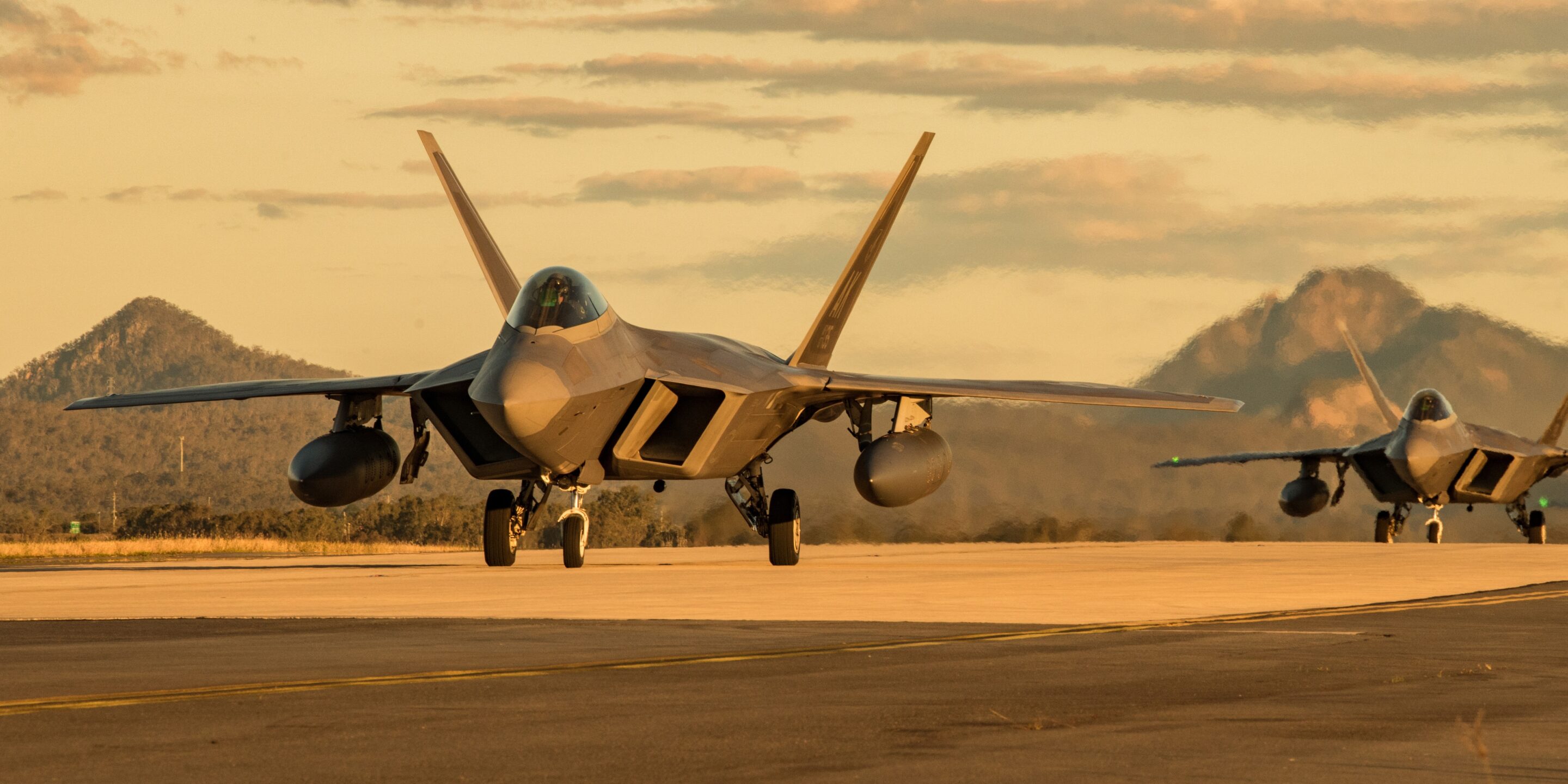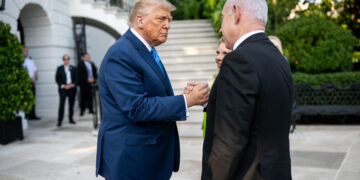Home / Middle East / Israel-Saudi normalization agreement: What is in it for the U.S.?
Middle East, Israel
November 20, 2023
Israel-Saudi normalization agreement: What is in it for the U.S.?
By Michael DiMino and Daniel DePetris

Key points
- Over the last year, the Kingdom of Saudi Arabia (KSA) and Government of Israel (GOI) have pursued a diplomatic normalization agreement, with U.S. support, to build a lasting regional security framework beyond the Abraham Accords. Negotiations remain fluid and, since the attack on Israel by Hamas on October 7, on hold.1Aziz El Yaakoubi and Parisa Hafzei, “Saudi Arabia Puts Israel Deal on Ice Amid War, Engages with Iran, Sources Say,” Reuters, October 13, 2023, https://www.reuters.com/world/middle-east/saudi-arabia-puts-israel-deal-ice-amid-war-engages-with-iran-sources-say-2023-10-13/.
- Normalization is arguably in the interest of both Israel and Saudi Arabia. For Tel Aviv, formal ties with Riyadh would represent greater integration into the Middle East’s political order and a boost to trade. For Saudi Arabia, formal ties with Israel would boost the personal legacy of Saudi Crown Prince Mohammed bin Salman (MBS) and expand KSA’s geopolitical clout. The states may eventually come to deal on their own. However, the U.S. shouldn’t force the issue by lending KSA unnecessary concessions, particularly if they turn the U.S. military into a praetorian guard for the Saudi royal family.
- If talks resume, KSA will likely still seek a U.S. security guarantee, assistance with a civilian nuclear energy program, and financial or territorial concessions for Palestinians.
- For the Biden Administration, the preservation of a “two-state solution” would be seen as a policy win that solidifies waning U.S. leadership in the region, pushes back on Chinese influence in the Gulf, and enhances regional stability. However, an Israel-Saudi deal is only nice to have—not necessary—for U.S. policy objectives in the Middle East.
- The question isn’t whether normalization between Israel and Saudi Arabia should be supported—it’s how much the U.S. should pay for it. If normalization were instrumental to achieve core U.S. objectives in the Middle East, then perhaps the U.S. should meet Riyadh’s demands. But this isn’t the case. The U.S. should instead consider any KSA demands on an ad hoc basis by their proportional ability to serve American interest and alleviate U.S. involvement in the region.
- Security guarantees for KSA should be an absolute “no,” however, as no benefit to the U.S. justifies the inevitable costs and risks.
Background
- The October 7 Hamas terrorist attack on Israel delayed the timeline to reach any deal, as both Tel Aviv and Riyadh will spend time placating domestic audiences among their respective polities. The ongoing Israeli offensive in Gaza will no doubt further outrage an already incensed Arab publics and discourage MBS from resuming negotiations.2Najib Jobain, Samy Magdy, and Lee Keath, “Israel pushes deeper into Gaza and frees Hamas captive; Netanyahu rejects calls for cease-fire,” Associated Press, October 31, 2023, https://apnews.com/article/israel-palestinians-hamas-gaza-war-news-10-30-2023-131e9537aaad8e74586cc114d2668e5a. The reputational boost of assuming the “savior of Palestine” mantle in the pan-Arabist milieu is a key motivator for MBS to strike a deal.
- The potential Saudi-Israel normalization deal isn’t dead. The Biden administration has expressed confidence the Saudis will eventually return to the negotiating table with Israel, likely after the war in Gaza is over.3The White House, “Press Briefing by Press Secretary Karine Jean-Pierre and NSC Coordinator for Strategic Communications John Kirby,” October 31, 2023, https://www.whitehouse.gov/briefing-room/press-briefings/2023/10/31/press-briefing-by-press-secretary-karine-jean-pierre-and-nsc-coordinator-for-strategic-communications-john-kirby-25/.
- The push for normalization comes after years in which both countries have improved their ties, including but not limited to a shared apprehension of Iranian influence in the region. The Biden administration has invested diplomatic capital to forge a formal establishment between Israel and Saudi Arabia.
- In the past, MBS appeared willing to jettison the 2002 Arab Peace Initiative, the previous Saudi-backed framework to establish formal relations with Israel in exchange for an Israeli withdrawal from the West Bank and the creation of a Palestinian state along pre-1967 lines.4Konrad-Adenauer-Stiftung, “The Arab Peace Initiative, 2002,” https://www.kas.de/c/document_library/get_file?uuid=a5dab26d-a2fe-dc66-8910-a13730828279&groupId=268421. Before the Israel-Hamas war, Riyadh was open to moving forward on normalization absent a two-state solution, as long as Israel provides the Palestinian Authority (PA) with some economic and territorial concessions. The Saudis have taken a tougher position since the war, signing onto a November 11 joint Arab-Islamic Summit declaration reaffirming that a credible peace process between Israel and the Palestinians should be based on a two-state solution.5Foreign Ministry of Oman, “Final statement of extraordinary joint Arab Islamic summit,” November 11, 2023, https://fm.gov.om/final-statement-of-extraordinary-joint-arab-islamic-summit/.
- More important, Saudi Arabia is using the normalization track with Israel as a vehicle to press the U.S. for a security guarantee, similar to U.S. mutual defense agreements with Japan, South Korea, and the Philippines. KSA wants some degree of U.S. support for a civilian nuclear program, ideally with eventual independent uranium enrichment capabilities.
- To date, the U.S. has not publicly rejected any of Riyadh’s demands, which could soften—but are more likely to expand—depending on the outcome of the Israel-Hamas conflict.
The case for normalization: countering Iran and China
- Proponents of a deal argue that the security dividends for the U.S. would be considerable. By Institutionalizing Saudi-Israeli defense ties, the U.S. will enhance the strength and credibility of a balancing coalition against Iran.
- Bringing the Saudis under the U.S. defense umbrella, advocates say, will reassure Riyadh of the U.S. commitment to both the bilateral relationship and the region more broadly, minimizing the appeal of China or Russia as alternative partners in the region.
The case against normalization: is it worth it?
- Vital U.S. interests in the Middle East are modest and require modest effort to achieve: (1) defend against specific, credible anti-U.S. terrorism threats and (2) avoid systemic, long-term disruptions to the flow of energy resources.
- The U.S. doesn’t need to formalize the pre-existing Saudi-Israeli defense relationship to deprioritize the Middle East from its grand strategy or reduce its force posture.
- The U.S. can continue to secure its interests without a formal alliance to protect the Saudis, which would entail yet another new major security burden at a time when the U.S. military is already overstretched.
U.S. exposure from stronger ties with Saudi Arabia
- There is no mutual military benefit to any hypothetical defense treaty. The U.S. would be expected to come to KSA’s defense in the event of an attack, while Riyadh would remain either incapable or unwilling to respond to any far-fetched U.S. request for direct military assistance, particularly in a great power war.
- Nor has past U.S. military support for Saudi Arabia paid off. Washington has made more than $140 billion in arms sales agreements with Riyadh over the past four presidential administrations.6U.S. Department of State, “United States-Saudi Arabia Relationship: Eight Decades of Partnership,” June 6, 2023, https://www.state.gov/united-states-saudi-arabia-relationship-eight-decades-of-partnership/#:~:text=Working%20with%20Saudi%20Arabia%20to,at%20more%20than%20%24140%20billion. What an effective Saudi military would do for the U.S. is unclear, but in any case, we did not get one. The Saudi defense establishment remains dysfunctional, and the Saudi military has proven incapable of performing even in low-intensity conflicts.7Nadwa Al-Dawsari, “Running around in circles: How Saudi Arabia is losing its war in Yemen to Iran,” Middle East Institute, March 3, 2020, https://www.mei.edu/publications/running-around-circles-how-saudi-arabia-losing-its-war-yemen-iran. After nearly eight years of war in Yemen, the Saudis failed to defeat Houthi forces, at considerable cost to their security and reputation, and are now seeking to extricate themselves from the war through negotiations.
- MBS is an erratic figure who has repeatedly demonstrated poor judgment that would be a U.S. liability in a treaty alliance: He orchestrated the kidnapping of a former Lebanese prime minister; gravely underestimated the difficulty of prosecuting a war in Yemen; lead an embargo of Qatar—a neighboring GCC member state—which prompted the island to buttress relations with Iran; and ordered the assassination of Jamal Khashoggi, a U.S. legal permanent resident and columnist at The Washington Post.8Lisa Barrington and Angus McDowall, “Lebanon accuses Saudi Arabia of holding its PM hostage,” Reuters, November 15, 2017, https://www.reuters.com/article/us-lebanon-politics/lebanon-accuses-saudi-arabia-of-holding-its-pm-hostage-idUSKBN1DF18A; Ben Hubbard and Nour Yousseff, “Yemen’s War Enters a Dark Stage as Rebels Squeeze the Capital,” New York Times, December 23, 2017, https://www.nytimes.com/2017/12/23/world/middleeast/yemen-sana-houthis-saudi-arabia.html; Samuel Ramani, “The Qatar Blockade is Over, but the Gulf Crisis Lives On,” Foreign Policy, January 27, 2021, https://foreignpolicy.com/2021/01/27/qatar-blockade-gcc-divisions-turkey-libya-palestine/; Julian E. Barnes and David E. Sanger, “Saudi Crown Prince Is Held Responsible for Khashoggi Killing in U.S. Report,” New York Times, February 26, 2021, https://www.nytimes.com/2021/02/26/us/politics/jamal-khashoggi-killing-cia-report.html.
- A U.S. security guarantee for KSA would enable MBS’s worst instincts and embolden him to act irresponsibly with the expectation U.S. military power would underwrite his actions.9Jeremy Shapiro and Richard Sokolsky, “How America enables its allies’ bad behavior,” Brookings Institution, May 4, 2016, https://www.brookings.edu/articles/how-america-enables-its-allies-bad-behavior/. In any possible KSA security pact, the risk of “reckless driving”—when U.S. allies or partners aggressively pursue self-interested policies that ultimately undermine U.S. interests—would be very high.10Barry Posen, Restraint: A New Foundation for U.S. Grand Strategy (Cornell, NY: Cornell University Press, 2014).
- By acceding to KSA demands for a security guarantee, the U.S. would further entangle itself in Gulf politics and local security threats when it should be reducing exposure to the region’s politics and violence.11Patricia Cohen, “Risk of a Wider Middle East War Threatens a ‘Fragile’ World Economy,” New York Times, November 1, 2023, https://www.nytimes.com/2023/11/01/business/economy/israel-gaza-war-global-economy.html. KSA faces several threats from terrorism and regional rivals, and these problems would become U.S. problems overnight without a significant security upside. Terrorism, the Houthi war in Yemen, or an expansion of the Israel-Hamas conflict could trigger Riyadh to invoke direct U.S. military assistance. A formal commitment might induce “credibility” concerns if the U.S. didn’t respond, even when U.S. interests aren’t at risk.
- Claims that the U.S. needs a larger balancing coalition against Iran are also unconvincing, even after the outbreak of the Israel-Hamas war. Iran’s military has limited conventional force projection capabilities, and a regional coalition against Tehran already exists—that coalition could expand if fighting in Gaza spreads, though Iran and Saudi Arabia have also shown limited signs the conflict may further a temporary detente.12“Iran’s Raisi, Saudi Arabia’s MBS discuss Israel-Hamas war,” Al Jazeera, October 12, 2023, https://www.aljazeera.com/news/2023/10/12/irans-raisi-saudi-arabias-mbs-discuss-israel-hamas-war.
- Iranian power remains both exaggerated and misunderstood: Its economy continues to underperform, and its conventional military is antiquated and untested. Tehran simply doesn’t have the financial capital or hard power capabilities to dominate the Middle East or directly threaten core U.S. interests.13Daniel DePetris, “‘Maximum Pressure Harms Diplomacy and Increases Risks of War with Iran,” Defense Priorities, November 19, 2021, https://www.defensepriorities.org/explainers/maximum-pressure-harms-diplomacy-and-increases-risks-of-war-with-iran.
Saudi-China relations continue independent of any deal
- S. defense guarantees are also highly unlikely to curb Saudi-China engagement. Bilateral trade between Riyadh and Beijing reached $106 billion in 2022, a 30 percent increase from the previous year.14Nik Martin, “China’s economic ambitions a huge draw for Saudi Arabia,” Deutsche Welle, June 13, 2023, https://amp.dw.com/en/chinas-economic-ambitions-a-huge-draw-for-saudi-arabia/a-65889319. In comparison, trade between Riyadh and Washington netted less than one-third that amount ($34 billion) in 2022.15United State Census Bureau, “Trade in Goods with Saudi Arabia,” https://www.census.gov/foreign-trade/balance/c5170.html. China is a key foreign investor in KSA’s economy at a time when MBS is trying to decrease reliance on crude oil for state revenue and transition further into financial services, technology and green-energy sectors. Relations with China are too valuable for KSA to restrict, and a U.S. security guarantee alone isn’t likely to persuade MBS otherwise.
- China has expressed no interest in displacing the U.S. as a security provider for the Persian Gulf. Instead, China has pursued a balanced foreign policy with the region’s major powers, and—as demonstrated by the reconciliation agreement negotiations between Saudi Arabia and Iran—Beijing’s neutrality gives it flexibility and leverage, though China isn’t immune to its own entanglement in the region’s politics.16Adam Gallagher, Sarhang Hamasaeed, and Garrett Nada, “What You Need to Know About China’s Saudi-Iran Deal,” United States Institute of Peace, March 16, 2023, https://www.usip.org/publications/2023/03/what-you-need-know-about-chinas-saudi-iran-deal. China will likely remain militarily disengaged in the region, with or without a U.S. defense guarantee to Riyadh. As the Israel-Hamas conflict has shown, even if China wanted to assume America’s role in the Middle East, it would overwhelm Beijing’s still limited power projection capabilities and harm its economy.17Danielle Pletka and Daniel Blumenthal, “China Won’t Replace the U.S. in the Middle East,” Foreign Policy, July 20, 2022, https://foreignpolicy.com/2022/07/20/china-us-middle-east-relations-hegemon-saudi-iran/; Laure He, “From Russia to the Middle East: Why China can’t afford another big conflict,” CNN, October 19, 2023, https://www.cnn.com/2023/10/19/economy/china-middle-east-russia-oil-intl-hnk/index.html.
For more analysis, or to connect with our experts, please contact Defense Priorities at press@defp.org.
Endnotes
- 1Aziz El Yaakoubi and Parisa Hafzei, “Saudi Arabia Puts Israel Deal on Ice Amid War, Engages with Iran, Sources Say,” Reuters, October 13, 2023, https://www.reuters.com/world/middle-east/saudi-arabia-puts-israel-deal-ice-amid-war-engages-with-iran-sources-say-2023-10-13/.
- 2Najib Jobain, Samy Magdy, and Lee Keath, “Israel pushes deeper into Gaza and frees Hamas captive; Netanyahu rejects calls for cease-fire,” Associated Press, October 31, 2023, https://apnews.com/article/israel-palestinians-hamas-gaza-war-news-10-30-2023-131e9537aaad8e74586cc114d2668e5a.
- 3The White House, “Press Briefing by Press Secretary Karine Jean-Pierre and NSC Coordinator for Strategic Communications John Kirby,” October 31, 2023, https://www.whitehouse.gov/briefing-room/press-briefings/2023/10/31/press-briefing-by-press-secretary-karine-jean-pierre-and-nsc-coordinator-for-strategic-communications-john-kirby-25/.
- 4Konrad-Adenauer-Stiftung, “The Arab Peace Initiative, 2002,” https://www.kas.de/c/document_library/get_file?uuid=a5dab26d-a2fe-dc66-8910-a13730828279&groupId=268421.
- 5Foreign Ministry of Oman, “Final statement of extraordinary joint Arab Islamic summit,” November 11, 2023, https://fm.gov.om/final-statement-of-extraordinary-joint-arab-islamic-summit/.
- 6U.S. Department of State, “United States-Saudi Arabia Relationship: Eight Decades of Partnership,” June 6, 2023, https://www.state.gov/united-states-saudi-arabia-relationship-eight-decades-of-partnership/#:~:text=Working%20with%20Saudi%20Arabia%20to,at%20more%20than%20%24140%20billion.
- 7Nadwa Al-Dawsari, “Running around in circles: How Saudi Arabia is losing its war in Yemen to Iran,” Middle East Institute, March 3, 2020, https://www.mei.edu/publications/running-around-circles-how-saudi-arabia-losing-its-war-yemen-iran.
- 8Lisa Barrington and Angus McDowall, “Lebanon accuses Saudi Arabia of holding its PM hostage,” Reuters, November 15, 2017, https://www.reuters.com/article/us-lebanon-politics/lebanon-accuses-saudi-arabia-of-holding-its-pm-hostage-idUSKBN1DF18A; Ben Hubbard and Nour Yousseff, “Yemen’s War Enters a Dark Stage as Rebels Squeeze the Capital,” New York Times, December 23, 2017, https://www.nytimes.com/2017/12/23/world/middleeast/yemen-sana-houthis-saudi-arabia.html; Samuel Ramani, “The Qatar Blockade is Over, but the Gulf Crisis Lives On,” Foreign Policy, January 27, 2021, https://foreignpolicy.com/2021/01/27/qatar-blockade-gcc-divisions-turkey-libya-palestine/; Julian E. Barnes and David E. Sanger, “Saudi Crown Prince Is Held Responsible for Khashoggi Killing in U.S. Report,” New York Times, February 26, 2021, https://www.nytimes.com/2021/02/26/us/politics/jamal-khashoggi-killing-cia-report.html.
- 9Jeremy Shapiro and Richard Sokolsky, “How America enables its allies’ bad behavior,” Brookings Institution, May 4, 2016, https://www.brookings.edu/articles/how-america-enables-its-allies-bad-behavior/.
- 10Barry Posen, Restraint: A New Foundation for U.S. Grand Strategy (Cornell, NY: Cornell University Press, 2014).
- 11Patricia Cohen, “Risk of a Wider Middle East War Threatens a ‘Fragile’ World Economy,” New York Times, November 1, 2023, https://www.nytimes.com/2023/11/01/business/economy/israel-gaza-war-global-economy.html.
- 12“Iran’s Raisi, Saudi Arabia’s MBS discuss Israel-Hamas war,” Al Jazeera, October 12, 2023, https://www.aljazeera.com/news/2023/10/12/irans-raisi-saudi-arabias-mbs-discuss-israel-hamas-war.
- 13Daniel DePetris, “‘Maximum Pressure Harms Diplomacy and Increases Risks of War with Iran,” Defense Priorities, November 19, 2021, https://www.defensepriorities.org/explainers/maximum-pressure-harms-diplomacy-and-increases-risks-of-war-with-iran.
- 14Nik Martin, “China’s economic ambitions a huge draw for Saudi Arabia,” Deutsche Welle, June 13, 2023, https://amp.dw.com/en/chinas-economic-ambitions-a-huge-draw-for-saudi-arabia/a-65889319.
- 15United State Census Bureau, “Trade in Goods with Saudi Arabia,” https://www.census.gov/foreign-trade/balance/c5170.html.
- 16Adam Gallagher, Sarhang Hamasaeed, and Garrett Nada, “What You Need to Know About China’s Saudi-Iran Deal,” United States Institute of Peace, March 16, 2023, https://www.usip.org/publications/2023/03/what-you-need-know-about-chinas-saudi-iran-deal.
- 17Danielle Pletka and Daniel Blumenthal, “China Won’t Replace the U.S. in the Middle East,” Foreign Policy, July 20, 2022, https://foreignpolicy.com/2022/07/20/china-us-middle-east-relations-hegemon-saudi-iran/; Laure He, “From Russia to the Middle East: Why China can’t afford another big conflict,” CNN, October 19, 2023, https://www.cnn.com/2023/10/19/economy/china-middle-east-russia-oil-intl-hnk/index.html.
More on Middle East

By Daniel DePetris and Rajan Menon
July 17, 2025

Featuring Rosemary Kelanic
July 17, 2025

ExplainerMilitary analysis, Air power, Basing and force posture, Land power, Naval power
By Jennifer Kavanagh and Dan Caldwell
July 9, 2025
Events on Middle East

virtualMiddle East, Basing and force posture, Diplomacy, Houthis, Iran, Iraq, Israel, Israel‑Hamas, Military analysis, Syria
May 16, 2025

virtualSyria, Balance of power, Basing and force posture, Counterterrorism, Middle East, Military analysis
February 21, 2025





